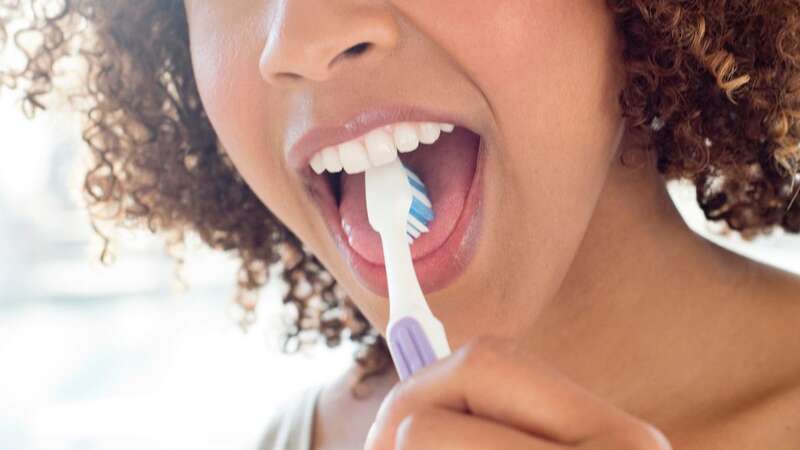

We all brush our teeth - but what about our tongues?
Skipping out on giving it the once over with the bristles may seem a minor oversight, but you'd be surprised just how much it can affect your oral health. The tongue is a massive haven for bacteria, food particles, and dead cells - making it a prime breeding ground for plaque formation and bad breath. When you neglect to clean your tongue, these harmful elements can add up to various oral health issues, with one of the most immediate being a build-up of bacteria.
The tongue's rough surface provides ample crevices for bugs to hide and thrive, leading to troublesome plaque. This sticky substance can accumulate on your tongue before spreading to your teeth and gums, increasing the risk of cavities, gum disease, and other dental problems.
Dr Deepa Vakil, lead dentist and clinical director of Yor Dental, has compiled a handy guide to the perils of not brushing your tongue, along with some top tips for how to clean it properly:
Perils of not brushing your tongue
Bacterial growth
 I was trolled for my 'baby smile' so got Turkey teeth - now I look so much younger
I was trolled for my 'baby smile' so got Turkey teeth - now I look so much younger
The tongue's rough surface harbours bacteria, food particles, and dead cells, providing an ideal environment for bacterial growth. Neglecting to clean your tongue allows these bacteria to proliferate, contributing to plaque formation and oral health issues.
Increased risk of bad breath
Bacteria on the tongue produce volatile sulphur compounds, leading to foul-smelling breath. Failure to remove this bacteria through regular tongue cleaning can result in persistent bad breath, also known as halitosis.
Plaque accumulation
Just like on teeth, plaque can accumulate on the surface of the tongue. This plaque buildup can spread to other areas of the mouth, increasing the risk of cavities, gum disease, and other dental problems.
Gum health
Bacteria on the tongue can migrate to the gums, contributing to inflammation and gum disease. Poor gum health not only affects oral health but has also been linked to systemic health issues such as cardiovascular disease and diabetes.
If you can't see the poll, click here
Impaired taste
A coated tongue can interfere with taste sensation, making food less enjoyable. Cleaning the tongue regularly can help maintain taste bud function and enhance the sensory experience of eating.
 I won a £25,000 payout from dentist after I was left with 'basically no teeth'
I won a £25,000 payout from dentist after I was left with 'basically no teeth'
Compromised immune response
The oral cavity serves as a gateway for pathogens to enter the body. Neglecting tongue hygiene can compromise the mouth's natural defense mechanisms, potentially increasing susceptibility to oral infections and other illnesses.
Overall oral hygiene
Tongue cleaning is an essential component of a comprehensive oral hygiene routine. Neglecting to brush the tongue can undermine the effectiveness of brushing and flossing, leaving behind harmful bacteria that contribute to oral health problems. To properly brush your tongue, it's essential to incorporate it into your daily oral hygiene routine.
Top tips for effective tongue brushing
Use a tongue scraper
Tongue scrapers are specifically designed to remove bacteria, food debris, and dead cells from the surface of the tongue. They are typically made of plastic or metal and feature a slightly curved shape to match the contours of the tongue. To use a tongue scraper, simply place it at the back of your tongue and gently scrape forward towards the tip, rinsing off any residue between strokes.
Brushing technique
If you don't have a tongue scraper, you can use your toothbrush to clean your tongue. Start by brushing the back of your tongue and then work your way forward, using gentle strokes to remove build-up. Be sure to reach the sides and the centre of your tongue to thoroughly clean the entire surface.
Use toothpaste
Applying a small amount of toothpaste to your toothbrush before brushing your tongue can help to enhance the cleaning action and freshen your breath.
Brush regularly
Aim to brush your tongue as part of your daily oral hygiene routine, ideally after brushing your teeth. Consistency is key to maintaining a clean and healthy tongue.
Rinse thoroughly
After brushing your tongue, rinse your mouth thoroughly with water to remove any loosened debris and toothpaste residue. Remember to be gentle when brushing your tongue to avoid causing irritation or discomfort. With regular tongue brushing, you can help prevent bad breath, reduce the build-up of bacteria, and maintain better overall oral health.